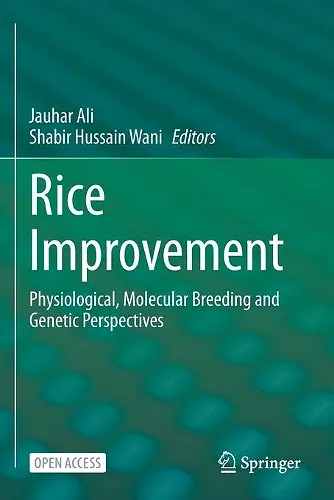Rice Improvement
Physiological, Molecular Breeding and Genetic Perspectives
Shabir Hussain Wani editor Jauhar Ali editor
Format:Paperback
Publisher:Springer Nature Switzerland AG
Published:6th May '21
Should be back in stock very soon
This paperback is available in another edition too:
- Hardback£44.99(9783030665296)

This book is open access under a CC BY 4.0 license.
By 2050, human population is expected to reach 9.7 billion. The demand for increased food production needs to be met from ever reducing resources of land, water and other environmental constraints. Rice remains the staple food source for a majority of the global populations, but especially in Asia where ninety percent of rice is grown and consumed. Climate change continues to impose abiotic and biotic stresses that curtail rice quality and yields. Researchers have been challenged to provide innovative solutions to maintain, or even increase, rice production. Amongst them, the ‘green super rice’ breeding strategy has been successful for leading the development and release of multiple abiotic and biotic stress tolerant rice varieties. Recent advances in plant molecular biology and biotechnologies have led to the identification of stress responsive genes and signaling pathways, which open up new paradigms toaugment rice productivity. Accordingly, transcription factors, protein kinases and enzymes for generating protective metabolites and proteins all contribute to an intricate network of events that guard and maintain cellular integrity. In addition, various quantitative trait loci associated with elevated stress tolerance have been cloned, resulting in the detection of novel genes for biotic and abiotic stress resistance. Mechanistic understanding of the genetic basis of traits, such as N and P use, is allowing rice researchers to engineer nutrient-efficient rice varieties, which would result in higher yields with lower inputs. Likewise, the research in micronutrients biosynthesis opens doors to genetic engineering of metabolic pathways to enhance micronutrients production. With third generation sequencing techniques on the horizon, exciting progress can be expected to vastly improve molecular markers for gene-trait associations forecast with increasing accuracy.
This book emphasizes on the areas of rice science that attempt to overcome the foremost limitations in rice production. Our intention is to highlight research advances in the fields of physiology, molecular breeding and genetics, with a special focus on increasing productivity, improving biotic and abiotic stress tolerance and nutritional quality of rice.
ISBN: 9783030665326
Dimensions: unknown
Weight: unknown
498 pages
1st ed. 2021